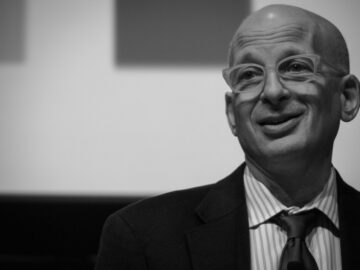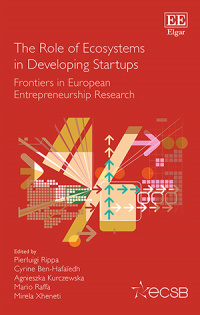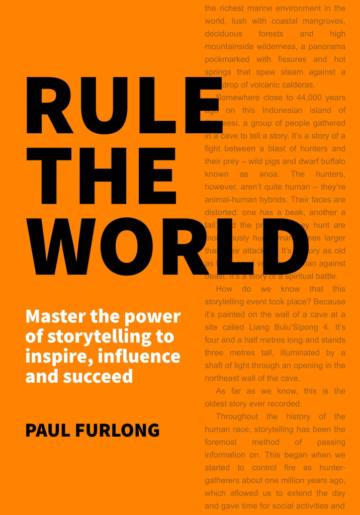There is a big hype around AI and this is pretty normal when a seismic shift is announced. The mainstream narrative sounds pretty pessimistic. One for all, the interview with Mo Gawdat, the former chief business officer at Google X, spurred a very negative atmosphere: “The risks are so bad, in fact, that when considering all the other threats to humanity, you should hold off from having kids if you are yet to become a parent.”

Former Google X’s chief, Mo Gawdat, wishes he “hadn’t started” AI as “humanity is the threat.”
However, a more rational approach would benefit us in tackling such a complex issue. During her lecture at the University of Glasgow to commemorate the 300th anniversary of Adam Smith’s birth, the IMF’s First Deputy Managing Director, Gita Gopinath, focused on AI Through the ideas of Adam Smith.
Indeed, her speech was titled “The Power and Perils of the ‘Artificial Hand’” recalling Smith’s ‘Invisible Hand’. “The Wealth of Nations, for example, was published the same year James Watt unveiled his steam engine,” she pointed out thus on the verge of a huge shift in human history.
For AI, we find ourselves in a similar “inflection point”, she argued, where technology can change our lives even redefining “what it means to be human.” Thus, the question:
“If he were alive today, how would Adam Smith have responded to the emergence of this new ‘artificial hand’?”
(Gita Gopinath)
Let’s start with the opportunities. Early evidence suggests AI could substantially raise productivity, Gopinath claims. According to a recent study, the increase could equal 14 percent on average, with the greatest impact on novice and low-skilled workers, and minimal impact on experienced and highly skilled workers. Why? Because AI would help spread tacit knowledge of more able workers and helps newer workers. Transferring it to a large scale, Goldman Sachs forecast AI could increase global output by 7%, or roughly $7 trillion, over a decade.
Also, AI could shake up the labour market in unprecedented ways. AI could shake up the labour market in unprecedented ways by reducing job-market polarization flattening the hierarchical structures of firms, increasing the number of workers in junior positions and decreasing the number in middle management and senior roles. In other words, the introduction of AI would create a level playing field.
The other way around though, nothing can guarantee that AI will benefit human beings. “It’s quite possible that AI might simply replace human jobs without creating new, more productive work for humans to move into, as the economist Daron Acemoglu has noted.” Recalling the work of Adam Smith and the critique of mercantilists eager to expand trade at all costs favouring a concentration in the hands of a few, Gopinath stressed that this aspect suggests how important a regulation to ensure benefits to the whole society would be: “We urgently need sound, smart regulations that ensure AI is harnessed for the benefit of society.” In other words: “When it comes to AI, we need more than new rules: we need to recognize that this might be an entirely new game. And that will require an entirely new approach to public policy.”
And this is what all the big names involved in the game are asking for.
Interested to find out more? Please click here.
- SEO Powered Content & PR Distribution. Get Amplified Today.
- EVM Finance. Unified Interface for Decentralized Finance. Access Here.
- Quantum Media Group. IR/PR Amplified. Access Here.
- PlatoAiStream. Web3 Data Intelligence. Knowledge Amplified. Access Here.
- Source: https://thisisoliver.co/2023/06/10/the-artificial-hand-risks-and-opportunities-from-ai/
- :has
- :is
- :where
- $UP
- 1
- 14
- a
- Able
- According
- Adam
- Adam Smith
- AI
- All
- an
- and
- Anniversary
- announced
- approach
- ARE
- argued
- around
- AS
- aspect
- At
- Atmosphere
- average
- Bad
- BE
- because
- become
- benefit
- benefits
- Big
- birth
- business
- by
- CAN
- change
- chief
- claims
- click
- comes
- complex
- concentration
- considering
- content
- Costs
- could
- cover
- create
- Creating
- decade
- deputy
- Director
- during
- eager
- Early
- Economist
- embedded
- emergence
- Engine
- ensure
- entirely
- equal
- Even
- evidence
- example
- Expand
- experienced
- fact
- few
- field
- Files
- Find
- firms
- First
- focused
- For
- Former
- Foundation
- from
- game
- Gita Gopinath
- Global
- goldman
- greatest
- guarantee
- Hands
- Have
- having
- he
- help
- helps
- her
- highly
- his
- history
- hold
- How
- HTML
- HTTPS
- huge
- human
- Humanity
- Humans
- Hype
- ideas
- if
- IMF
- Impact
- important
- in
- In other
- Increase
- increasing
- into
- Introduction
- involved
- issue
- IT
- Jobs
- kids
- knowledge
- Labour
- large
- Lecture
- Level
- Lives
- Mainstream
- management
- managing
- Managing Director
- Market
- max-width
- means
- Middle
- might
- minimal
- more
- move
- names
- NARRATIVE
- Need
- negative
- New
- newer
- normal
- nothing
- novice
- number
- of
- off
- Officer
- on
- ONE
- opportunities
- or
- Other
- our
- ourselves
- out
- output
- over
- percent
- pessimistic
- plato
- Plato Data Intelligence
- PlatoData
- playing
- please
- policy
- positions
- possible
- power
- pretty
- productive
- public
- published
- question
- raise
- Rational
- recognize
- Redefining
- reducing
- Regulation
- replace
- require
- risks
- roles
- roughly
- rules
- same
- Scale
- senior
- she
- shift
- should
- similar
- simply
- skilled
- So
- Society
- Sound
- speech
- spread
- start
- Steam
- such
- Suggests
- Technology
- than
- that
- The
- The Economist
- this
- though?
- threat
- threats
- Through
- titled
- to
- today
- trade
- Transferring
- Trillion
- true
- university
- unprecedented
- unveiled
- us
- verge
- very
- was
- Way..
- ways
- we
- Wealth
- were
- What
- when
- whole
- why
- will
- wishes
- with
- without
- WordPress
- words
- Work
- workers
- would
- X
- X’s
- year
- yet
- you
- youtube
- zephyrnet










